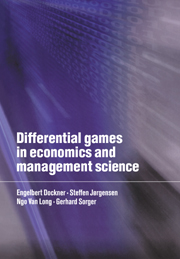Book contents
- Frontmatter
- Contents
- List of figures
- List of tables
- Preface
- 1 Introduction
- Part I Theory
- 2 Basic concepts of game theory
- 3 Control theoretic methods
- 4 Markovian equilibria with simultaneous play
- 5 Differential games with hierarchical play
- 6 Trigger strategy equilibria
- 7 Differential games with special structures
- 8 Stochastic differential games
- Part II Applications
- Answers and hints for exercises
- Bibliography
- Index
7 - Differential games with special structures
Published online by Cambridge University Press: 05 June 2012
- Frontmatter
- Contents
- List of figures
- List of tables
- Preface
- 1 Introduction
- Part I Theory
- 2 Basic concepts of game theory
- 3 Control theoretic methods
- 4 Markovian equilibria with simultaneous play
- 5 Differential games with hierarchical play
- 6 Trigger strategy equilibria
- 7 Differential games with special structures
- 8 Stochastic differential games
- Part II Applications
- Answers and hints for exercises
- Bibliography
- Index
Summary
In this chapter we are concerned with the analysis of tractable game structures. More specifically, we investigate various classes of differential games for which one can derive analytical characterizations of open-loop and Markov perfect Nash equilibria. We stress analytical tractability since we believe that analytical solutions have the advantage of shedding light on the qualitative properties of equilibria in a general way.
We identify three different classes of games for which we discuss the derivation of both open-loop and Markov perfect Nash equilibria. The first class is that of linear quadratic games. Such a game is characterized by a linear system of state equations and quadratic objective functions. The class of linear quadratic differential games has not only gained popularity among dynamic game theorists but also among macroeconomists interested in issues such as policy coordination, optimal stabilization policies, and the like. For this reason we present some macroeconomic interpretations of linear quadratic games.
The second class of solvable differential games we consider consists of games in which the state variables enter both the state equations and the objective functions linearly. We refer to this class as linear state games. We show that these games have the property that an open-loop Nash equilibrium is Markov perfect and that the optimal value functions are linear with respect to the state variables.
The third class of games discussed in this chapter is exponential games. In this class the state variables enter the objective functions via an exponential term while the state equation is independent of the state variables.
- Type
- Chapter
- Information
- Differential Games in Economics and Management Science , pp. 170 - 200Publisher: Cambridge University PressPrint publication year: 2000



